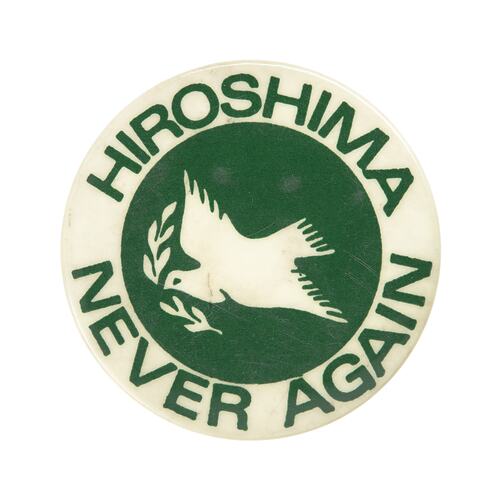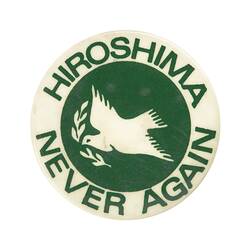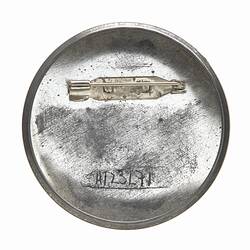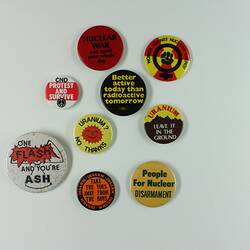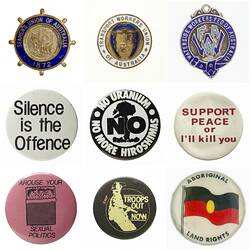Summary
Circular green and white badge featuring image of dove bearing olive branch, and the words ''Hiroshima Never Again'. Hiroshima, Japan was hit by an atomic bomb on 6 August 1945, dropped by the United States in an attempt to speed the end of World War II. Three days later another atomic bomb was dropped, this time on Nagasaki. The bombs were devastating in their human toll, and their effects reverberate to this day. Anti-nuclear protestors use 6 August as a focus for their activities. The choice to commemorate the events on this day came from Hiroshima in 1948, but it soon spread to the entire world.
Physical Description
Circular badge, white, with green printing. Features image of dove bearing olive branch, and inscription around. Silver metal, plastic-coated, with safety pin fastener adhered to back through holes in metal backing piece.
Significance
The donor describes herself as a social activist rather than a political activist. In the 1960s she became involved in the Beat Generation in Europe, and shared many of their values.
Ann originally studied commerce at the University of Melbourne in 1962-1966. She moved into college, choosing the women's college Janet Clarke Hall. Here she became involved in theatre and women's activities - she recalls attending a meeting also attended by Germaine Greer. She also became interested in sustainable development during her time as a commerce student. After graduating, she worked as trainee computer programmer at Kodak. She soon decided, however, that the work did not suit her, and set out on a world-wide adventure in the mid-1960s. She travelled (principally) overland through Indonesia to Singapore, then through Thailand into Laos, where she travelled near the American Zone. She avoided Vietnam, which was then at war. She then travelled up to India, through the Himalayas and across into Europe. She lived in Copenhagen for some time, where she became involved with American Beat Generation expatriates. She later travelled to New York, Mexico, then overland back to Australia after a three-year absence, where she began work in a bank. Ann cites this as evidence she was not a hippy! However, she did attend anti-Vietnam war rallies (she was strongly opposed to the Vietnam war), attend one or two Labour Party meetings and continued her interested in sustainability. She also became involved with the Melbourne Filmmakers Cooperative in the early 1970s, acting as their treasurer. (The Cooperative organised showings of experimental film, at one stage from the small theatre in Spring Street next to Her Majesty's Theatre, and at another stage set up a theatre in the building that is now Lygon Court.)
Ann worked up to a senior role in the banking sector, becoming the group's first female manager. During the 1970s, she decided to move on from this career and follow her passion for art. She attended art college, training as a ceramicist. The interest led to a PhD in art history, curatorial studies and subsequent work as a museums registrar from the late 1990s. Ann also became involved with ICOM Australia, sitting on its Executive Board, and in 2009 was continuing her responsibility for its web site.
More Information
-
Collecting Areas
Public Life & Institutions, Home & Community, Migration & Cultural Diversity
-
Acquisition Information
Donation from Dr Ann Wookey, 22 Apr 2009
-
Place Named
-
Inscriptions
INSCRIPTIONS: Printed on front: 'HIROSHIMA / NEVER AGAIN'.
-
Classification
-
Category
-
Discipline
-
Type of item
-
Overall Dimensions
3 mm (Depth), 45 mm (Outside Diameter)
-
Keywords
Nuclear Disarmament, Anti-Nuclear Protests, Peace, Peace Movements, Activism, Hiroshima Atomic Blast, 6 August 1945
